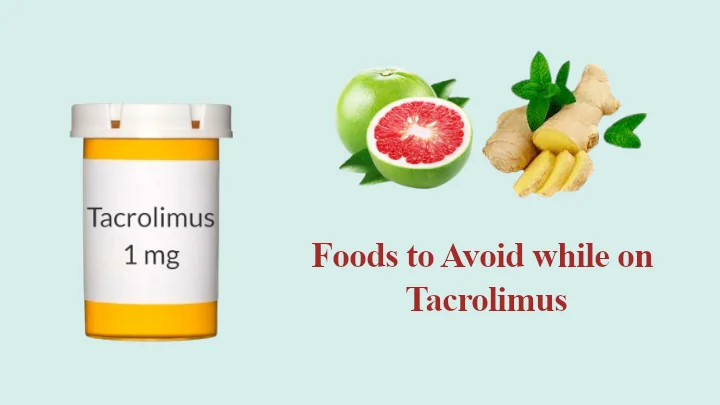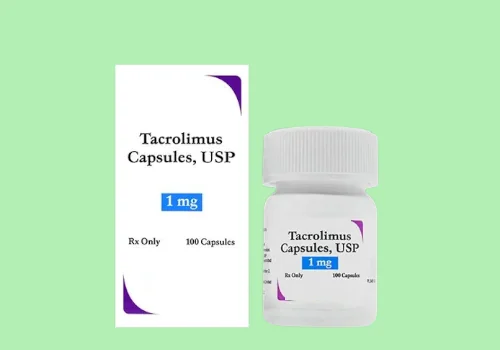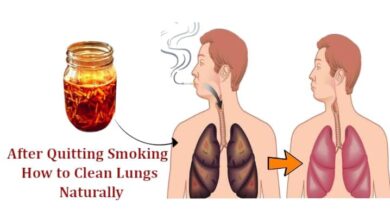11 Foods to Avoid while on Tacrolimus

Looking for foods to avoid while on tacrolimus. It’s incredible how far medical science has come that organ transplants are now a viable option for many people. Receiving an organ transplant can be a life-changing experience, but it doesn’t end when the surgery is over.
Post-transplant care is essential to ensure the success of the new organ, and tacrolimus is one of the essential medications used as part of this process. It’s great that these treatments exist and offer hope to those who need them!
Tacrolimus prevents the body’s immune system from rejecting the transplanted organ. Still, certain foods and beverages can interact with tacrolimus, altering its metabolism or causing adverse effects.
In this article, we’ll discuss some foods to avoid while taking tacrolimus so that you can confidently navigate your post-transplant diet and ensure your continued well-being. Let’s get started!
Foods to Avoid while on Tacrolimus
Here, we have listed what foods to avoid with tacrolimus

1. Grapefruit and Grapefruit juice
Foods to avoid when taking tacrolimus are grapefruit and grapefruit juice. The compounds in the fruit, called furanocoumarins, inhibit the activity of an enzyme called CYP3A4.
This enzyme plays a role in breaking down many drugs, including tacrolimus, which means consuming these fruits or their juices could interfere with how your body metabolises this drug.
If this happens, your bloodstream may contain higher levels of tacrolimus than intended, leading to serious side effects like kidney damage or even life-threatening toxicity!
2. Seville Oranges
Like grapefruit, Seville oranges contain compounds that can inhibit certain enzymes in the body. One of those enzymes is CYP3A4, which metabolises many drugs like tacrolimus.
So when we consume Seville oranges or their juice, it can lead to decreased metabolism of tacrolimus!
3. Alcohol
It’s essential to be aware of the potential effects that alcohol can have on your health. As you may know, both alcohol and tacrolimus are metabolized by the liver.
Consuming too much alcohol can strain your liver and potentially interfere with how it metabolizes tacrolimus.
This interference could affect the tacrolimus levels in your bloodstream, leading to toxicity if they’re too high.
4. Fatty foods
What not to eat when taking tacrolimus is fatty foods because it can interfere with the absorption of tacrolimus, an immunosuppressive medication prescribed to prevent organ transplant rejection.
Tacrolimus belongs to a class known as calcineurin inhibitors, and these drugs are sensitive to the presence of fat in our digestive system.
So, if anyone you know is taking this medication, they need to be mindful about their diet and avoid overeating fatty food!
5. Caffeine
Caffeine is a stimulant that can increase your heart rate and blood pressure. If taken in large doses or used excessively, it can further elevate these levels when combined with tacrolimus – potentially leading to cardiovascular issues. So please be mindful of how much caffeine you consume and talk to your doctor for any concerns!
6. High-sodium foods
Did you know that high-sodium foods can lead to an increase in blood pressure? It’s true! In addition, some medications like tacrolimus can also elevate your blood pressure as a side effect.
When your blood pressure is too high, it strains your heart and cardiovascular system because it has to work harder to pump the same amount of blood.
7. Salt Substitutes
Salt substitutes can help reduce sodium intake, but many contain potassium chloride instead of regular table salt, which could interfere with tacrolimus if your body is exposed to too much potassium. So monitor your levels carefully and talk to a healthcare professional for advice before making any changes!
8. Herbal Supplements
Herbal supplements can interfere with the metabolism of tacrolimus in the liver, leading to either increased or decreased levels of this medication in the bloodstream.
If there are too high levels, it could cause toxicity, and if they become too low, then organ rejection may occur. So, talk with your doctor before taking herbal supplements while on tacrolimus therapy!
9. High-oxalate foods
If we are taking immunosuppressive medications like tacrolimus, these medications can put us at an increased risk of developing kidney stones.
Kidney stones are hard deposits that form in the kidneys and can cause severe pain when they pass through the urinary tract.
It’s also important to be mindful of what you eat, as high-oxalate foods could potentially lead to higher levels of calcium in your urine, which increases your risk of forming kidney stones even more.
10. Licorice
It’s important to remember that undercooked eggs should be avoided by individuals on tacrolimus, especially those with weakened immune systems.
Salmonella bacteria can cause food poisoning, and people with suppressed immune systems are more likely to experience severe illness or complications if they contract a foodborne infection. So, let’s all stay safe and make sure our eggs are cooked through before eating them!
11. Fast food and Processed foods
Fast and processed foods are generally advised to be avoided or consumed in moderation, particularly for people taking tacrolimus.
High salt intake can cause high blood pressure, which is not recommended for people who take immunosuppressive medications like tacrolimus.
Fast and processed foods are often heavy in saturated and trans fats, both unhealthy. High-fat diets have been linked to various health issues, including heart disease and obesity. [source]
Q. Does turmeric interact with tacrolimus?
Ans- Yes, turmeric (Curcuma longa) and its active component, curcumin, may interact with tacrolimus. Turmeric’s anti-inflammatory and antioxidant properties make it popular as a spice and in traditional medicine.
It can, however, interfere with the metabolism of drugs and impact how some medications, such as tacrolimus, are digested in the body.
Q. Can you drink alcohol while taking Tacrolimus?
Ans- It is generally advised to avoid or limit alcohol consumption when taking tacrolimus. Tacrolimus is an immunosuppressive drug often used to prevent organ rejection during transplant surgery.
Alcohol can impair the effectiveness and metabolism of this drug and harm your overall health, particularly if your immune system is already impaired.
Conclusion
In conclusion, people receiving tacrolimus or any other immunosuppressive medicine must maintain a healthy and well-balanced diet, especially after a transplant. Avoiding specific foods can considerably improve the medication’s effectiveness and the patient’s overall well-being.
Read Next
- Does Coconut Oil Help for Yeast Infections
- What Foods to Avoid while Taking Enalapril
- Foods to Avoid with Sinus Infection
References
- Tacrolimus. A review of its pharmacology, and therapeutic potential in hepatic and renal transplantation
- Tacrolimus dose requirement in renal transplant recipients
- Tacrolimus and transplantation: A decade in review





